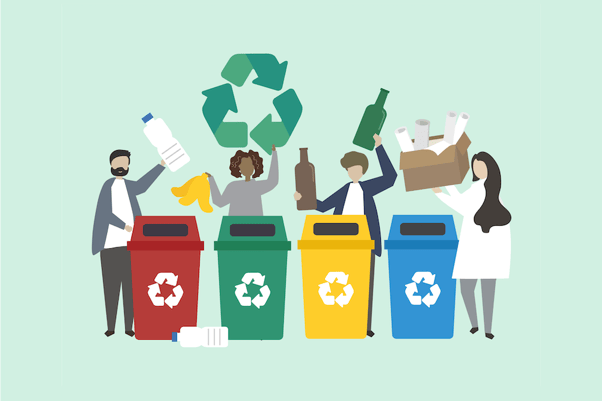Check out five simple ideas that your company can implement to significantly reduce its environmental footprint and contribute to a more sustaintable future while saving costs.
How Companies Can Contribute to a Sustainable Future
Climate change is a reality that cannot be ignored. The planet is getting warmer, and the consequences are becoming increasingly evident, from rising sea levels to more frequent and severe weather events. Companies are a major contributor to this problem, with their production processes and supply chains generating a significant amount of pollution and greenhouse gas emissions from global production. However, companies also have the power to make a positive impact by taking responsibility for their environmental impact and finding ways to reduce it. In fact, it can be easier than it seems. With just five simple ideas, companies can significantly reduce their environmental impact and contribute to a more sustainable future.
While they may seem straightforward, they can have a significant impact on reducing a company's environmental footprint. We will explore each idea and provide practical tips on how to implement them in your business. By following these, your company can become more sustainable, reduce costs, and make a positive contribution to the environment.

1. Implement a comprehensive recycling program
The three known cornerstones of sustainable thinking are based on three nouns that begin in R: Reuse, Reduction and Recycling. The last one is the the fundamental pillar of sustainable waste management. By implementing a comprehensive recycling program, companies can significantly reduce their environmental impact. To get started, consider providing separate bins for paper, plastic, glass, and other recyclable materials, and clearly label them to ensure that employees understand what goes where. Education is key, so provide training and educational materials to help employees understand the importance of recycling and what can and can't be recycled. Consider partnering with local recycling facilities to ensure that your materials are being properly disposed of and recycled. Not only does this step help the environment, but it can also reduce costs associated with waste disposal.
2. Reduce energy consumption through efficiency and renewable sources
Reducing energy consumption is a crucial step in becoming more environmentally friendly. One effective way to achieve this is by investing in energy-efficient technologies and practices. Start by conducting an energy audit to identify areas where energy is being wasted. Consider investing in energy-efficient lighting, equipment, and appliances, and encourage employees to turn off lights and electronics when not in use. Additionally, setting thermostats to reasonable temperatures can help reduce energy consumption. Another option is to consider switching to renewable energy sources like solar or wind power, that can operate at a very low cost. This can help reduce greenhouse gas emissions and provide long-term cost savings. By implementing these measures, companies can reduce their energy consumption, lower their carbon footprint, and contribute to a more sustainable future.
3. Promote sustainable transportation options
Transportation is a significant source of greenhouse gas emissions and can have a significant impact on the environment. Encouraging sustainable transportation options can help reduce this impact. Start by providing incentives for employees who use public transportation, carpool, bike, or walk to work. Consider offering preferred parking spots, bike racks, or public transportation subsidies. Additionally, companies can encourage virtual meetings and preferably remote working time options to reduce the need for travel. By promoting sustainable transportation options, companies can reduce their carbon footprint, improve air quality, and promote healthier lifestyles for their employees.
4. Implement waste reduction strategies
Reducing waste is a critical step in becoming more environmentally friendly. Companies can generate a lot of waste, from paper to food to packaging materials. To address this issue, consider implementing strategies to reduce waste. One option is to switch to digital files instead of printing. This can reduce paper consumption and save on printing costs. Another option is to provide reusable dishes and silverware in break rooms, reducing the need for disposable items. Companies can also reduce packaging waste by using biodegradable or compostable materials. Additionally, consider implementing a composting program for food waste. By implementing these waste reduction strategies, companies can significantly reduce their environmental impact, lower waste management costs, and demonstrate their commitment to sustainability.
5. Support environmental causes and initiatives
In addition to implementing environmental-friendly practices within your company, supporting environmental causes and initiatives can also have a significant impact. Consider sponsoring events or programs that promote sustainability, partnering with local organizations that focus on environmental issues, or making donations to environmental charities. Supporting these initiatives demonstrates your company's commitment to sustainability and can inspire employees and customers to do the same. Additionally, consider engaging in advocacy efforts to support environmental policies and regulations that align with your company's values. By supporting environmental causes and initiatives, companies can contribute to a healthier planet and a more sustainable future.
How Libryo Can Help Your Way to Sustainability
Libryo's regulation tracking makes it easy for any company to know their relevant Environment, Health & Safety (EHS) legal requirements and compliance status, right across the business.
Regulations and green initiatives are coming thick and fast for the energy industry which can be a jungle for legal, risk and compliance professionals to try and navigate. Libryo helps by curating only the law applicable to your sites, tracking this for ongoing changes and simplifying the way you search through a single, global platform. In this way, you can:
- Filter and track site-specific regulatory updates that impact your business, through a unified dashboard
- Whenever a regulation changes, get your local teams notified and with the update in hand so important stuff is never missed
- Conduct complete self-assessments to understand compliance levels at every operational site, company-wide and prioritize actions
- Monitor the compliance status across individual sites, no matter the jurisdiction, legal category or number of operations

